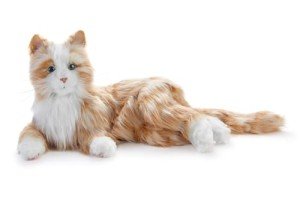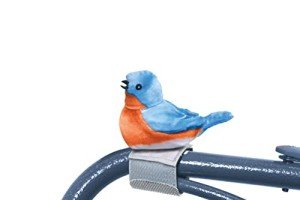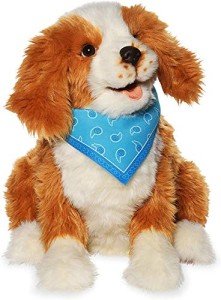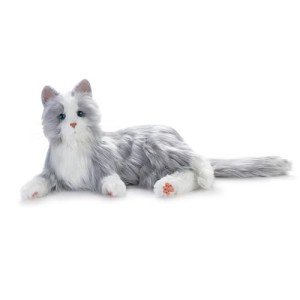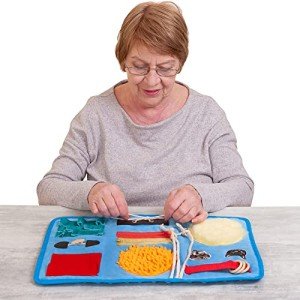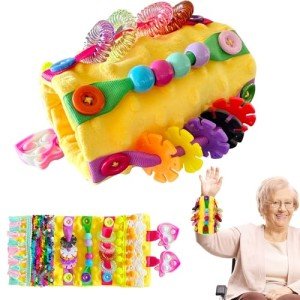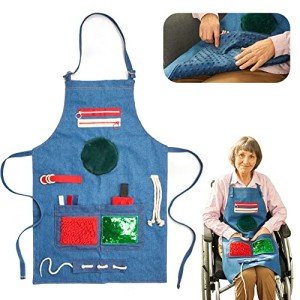Have you ever wondered "Should my loved one with dementia have a pet?"
Pets play a significant role in therapy, especially for individuals living with dementia. Their presence can bring comfort and joy, creating a calming atmosphere that benefits both emotional and physical well-being. In many care facilities, therapy animals are used as part of the treatment plan, providing companionship and assisting with the challenges that come with dementia.
One of the key benefits of having pets around is the emotional connection they foster. Animals are naturally intuitive and can often sense when someone is feeling anxious or upset. Their gentle nature and unconditional love can help reduce stress and agitation in individuals with dementia. A simple petting session or a few moments spent playing with a dog or cat can lead to smiles and laughter, which are essential for improving mood and overall quality of life.
Interactive Golden Retriever Dementia Comfort Companion Pet
Bring joy and companionship to your home with our lifelike interactive cuddly golden retriever, perfect for all ages
Product information
$43.95
Product links
Moreover, pets encourage social interactions and stimulate communication. Engaging with a pet can lead to conversations about memories or experiences related to animals, sparking joy and nostalgia. These interactions can help individuals with dementia feel more connected to those around them, bridging gaps in communication that often occur with the condition.
In addition to emotional support, pets can also promote physical activity. Taking a dog for a walk, playing with a cat, or even just engaging in gentle exercises with a pet can encourage movement. This activity is beneficial for physical health, helping to maintain mobility and overall fitness, which is especially important for seniors.
Interactive Orange Tabby Cat Dementia Companion
A delightful and engaging furry friend that brings joy and comfort to your home
Product information
$124.99
Product links
Joyful Moments with Animal Companions
Imagine a gentle dog wagging its tail excitedly as its owner walks through the door. This simple act can bring an instant smile to the face of someone dealing with the challenges of dementia. The routine of feeding, walking, or playing with a pet can create a sense of stability and predictability in an otherwise unpredictable world.
In addition to lifting spirits, engaging with pets can stimulate mental activity. Simple games like fetch or puzzles for pets can encourage physical movement and stimulate cognitive functions. This interaction not only keeps a person’s mind engaged but also fosters an emotional connection that enriches their lives.
Interactive Lifelike Companion Bird for Seniors
Enhance companionship and engagement with a delightful feathered friend designed to bring joy and comfort to seniors
Product information
$65.31
Product links
Tips for Choosing the Right Pet
Choosing the right pet can make a significant difference in the lives of those with dementia. It's essential to consider a few factors to ensure that the pet will bring joy and companionship. One of the first things to think about is the energy level of the pet. A calm and gentle animal can provide comfort without overwhelming a person with dementia. Breeds like the Cavalier King Charles Spaniel or a friendly cat may be ideal for creating a soothing environment.
Another important aspect is the size of the pet. Smaller animals, such as a guinea pig or a small dog, are often easier to handle and care for. They can also be less intimidating and more approachable. It's helpful to choose a pet that matches the physical capabilities of the person. For example, if mobility is an issue, a pet that doesn't require long walks or rigorous play sessions may be best.
Freckled Pup Interactive Companion Dementia Support
Experience the joy of companionship with our lifelike Freckled Pup, designed to bring comfort and happiness!
Product information
$134.97
Product links
Consider the care requirements of the pet as well. Some animals require more maintenance than others, which can be a challenge for someone with dementia. Low-maintenance pets, like fish or reptiles, can be enjoyable without requiring extensive care. If you're leaning towards a dog or cat, look for breeds that are known for their easygoing nature and minimal grooming needs.
It's beneficial to involve the person with dementia in the decision-making process, as long as it’s safe and feasible. Letting them meet different animals can help gauge their reactions and preferences. A connection between the pet and the individual can foster a sense of companionship, creating positive interactions and boosting emotional well-being.
Silver Interactive Cat Companion for Dementia Comfort
Lifelike companion that engages and entertains
Product information
$159.99
Product links
If an actual pet doesn't seem like the appropriate choice, a wonderful alternative is an interactive or robotic pet! These amazing creatures offer companionship without the hassle and responsibility of caring for a living being. Browse our options here:
DEMENTIA ANXIETY ASSISTANCE PRODUCTS


